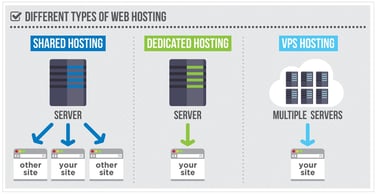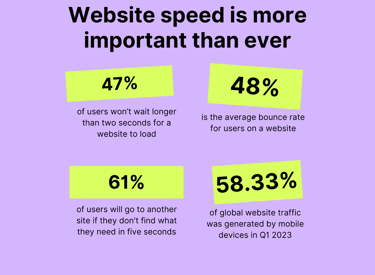What Is Web Hosting?
If you want to publish a website online, you need a web hosting plan. Think of your website as a house. Your website’s address (the protocol and domain name) is akin to a house address. The land upon which you build that house is made available by a web host.
A web host makes your website’s content accessible on the web by renting out physical server space to store the website’s data. It also provides the technologies and resources necessary for quick, secure, and dependable website operation. While you build a website, you need a web host to bring it to an online audience.
You have a variety of hosting types at your fingertips. For example, if you want to build a WordPress website, we recommend buying a managed WordPress hosting plan from Bluehost. It is the best web hosting service for WordPress (and a WordPress partner) and also the fastest WordPress hosting provider.
Some other popular web hosting types include shared hosting, VPS hosting, dedicated server hosting, and cloud hosting.
What Makes a Web Host Fast?
Fast web hosts use premium, well-maintained servers with powerful hardware components, including SSDs, ample RAM, and powerful processors for fast data access. A fast web hosting company offers rapid server response time, a minimum uptime guarantee of 99.9%, a CDN integration, a variety of caching techniques, and static file and image optimization techniques.
The proximity of the web hosting server, for example, plays an important role in website speed. If a great distance exists between the server and your location, data takes longer to travel. That increases latency and decreases the speed of your website.
Another factor is uptime, which determines the reliability of a web server. This metric expresses the amount of time a server is online. The industry-standard uptime for a web server is 99.9%. Ideally, the closer this figure is to 100%, the better. If your web server is offline for even a few minutes, it could be disastrous, as customers cannot access your website. First impressions online, especially negative ones, may be everlasting.
Does Your Web Host Affect Site Speed?
Simply put, a bad web host can lead to a slow website. A good web host provides many provisions to speed up your website. Let’s explore how a CDN, caching mechanisms, and image and static file optimization can speed up a website. A CDN improves website performance by caching content at the network edge.
Some web hosting plans include CDN integrations such as Cloudflare, while others offer custom CDNs. The best web hosting services provide pre-configured website caching mechanisms. Website caching is a procedure that stores a copy of static file content in a cache for quicker access and is implemented on both the client side and server side.
Large, unoptimized mages are one of the biggest culprits of slow websites. A web host that offers image optimization techniques significantly speeds up a website. That means the web host plays a crucial role in determining a website’s speed.
What Is a Good Speed for a Hosting Server?
You must use the 30- to 45-day trial period (or possibly more) that most web hosts effectively. In addition to testing all important hosting features, you should perform benchmark tests, including one to determine the hosting server’s speed. Users feel most at home when a webpage loads in one second or less. Anything around this mark (one to two seconds) is a good speed for a hosting server.
Thankfully, several third-party tools are available for website speed testing, and we recommend Pingdom. The results appear on your screen shortly after you run a website speed test. The ones that truly matter are time-to-first-byte (TTFB) and network latency. TTFB shows the responsiveness of your hosting server. Essentially, it is the amount of time it takes for the first bytes of data to appear on a client’s browser upon initiating a request.
You should also factor in other performance optimization tips. For example, some website speed testing tools break down the distribution of webpage components, showing you how long each takes to load. If one or more components clog up the website loading process, you can address them.
What Server Type Is Best for Speed?
You should select a server type according to your website requirements. The larger your website, the more resources you need. Shared hosting plans, for example, share server resources with other websites and could be a solid option for people with few website needs.
While shared hosting servers are cheap and reliable, both VPS hosting and dedicated hosting servers are faster and more dependable. VPS hosting and dedicated hosting plans are better suited to those with medium to large website needs. A VPS hosting plan offers better overall uptime and cybersecurity than a shared plan.
A dedicated hosting plan is the cream of the crop for website speed. Cloud hosting is another speedy hosting type, providing solid uptime, dependability, and flexibility. It is more expensive than shared hosting but cheaper than VPS hosting and dedicated server hosting.
How Fast Should My Website Load?
Every second counts when it comes to website load time. On average, a webpage takes 2.5 seconds to load on a desktop and 8.6 seconds to load on a smartphone. Your website should load faster than those averages on both device types. The longer your website takes to load, the higher the bounce rate you will experience.
A high bounce rate is an indication to search engines that users do not value your website’s content. Your Google Search ranking will fall considerably in that case. We recommend purchasing a fast web hosting plan to avoid that scenario. A fast web host will provide all the resources necessary to secure a desktop website load time of less than two seconds.
It will also provide mobile browsing optimization provisions. For example, A2 Hosting, IONOS, and Bluehost offer desktop website load times of less than 1.5 seconds. A one-second delay in website load time can reduce conversions significantly, so do not take it lightly.
How Can I Make My Website Faster?
For starters, you should purchase a performance-optimized web hosting plan. The web host plays an instrumental role in your website’s performance and management. If you already have a hosting plan, check your website’s speed by using a tool like Pingdom, GTmetrix, or Google PageSpeed Insights.
Analyze the test results and implement the list of suggestions to improve your website’s speed. For example, you may learn that one or more website elements are hindering speed. In that case, you should take all necessary action to restore normality.
Other tips to reduce your website’s loading speed include:
- Compress and optimize media files
- Reduce redirects
- Cache webpages
- Enable browser caching
- Use asynchronous and deferred loading for CSS and JavaScript files
- Minimize CSS, JavaScript, and HTMLfiles
- Use a CDN
- Remove unnecessary plugins
If you follow these suggestions and tips, your website will function quickly in no time.
The Fastest Web Hosts
A2 Hosting is hands down the fastest web host. With a webpage loading speed of just 0.295 seconds, it is hard to top. The hosting provider achieves that feat through its stellar, optimized software and hardware resources. IONOS is another solid option with a website load time of just 1.23 seconds. It offers the perfect combination of speed and value.
InMotion Hosting, Hostinger, Cloudways, and ScalaHosting are fast in their own rights, and they are also among the best web hosting companies for speed. No matter your business type or size, a swift website is a necessity. And it is impossible to have a fast website without a fast web host.
Quick hosting enhances the user experience, improves search engine rankings, reduces downtime, ensures reliability, and enhances security. So, select the right hosting type according to your requirements and purchase a robust hosting plan as soon as possible.






No comments:
Post a Comment